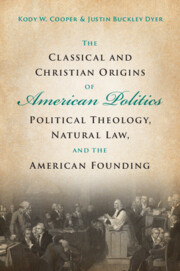 The Classical and Christian Origins of American Politics
The Classical and Christian Origins of American Politics Published online by Cambridge University Press: 22 December 2022
From the founding on, a dominant stream of American political thought and statesmanship has understood the polity in providentialist terms. Revolutionary leaders espoused belief in a particularly providential God, which is what we would expect if they also held to a classical Christian conception of natural law rather than the pantheistic naturalism alleged by modern scholars.We take our investigative cues from the providentialist proclamation by the Continental Congress that bookended the Revolutionary War, and we then engage in historical case studies of key players and events in American counterintelligence and French diplomacy. These case studies show that prominent actors in the war affirmed core tenets of classical theism: the existence of a creator God who providentially governs the cosmos and the destiny of men.According to these key participants engaged in espionage and diplomacy, the providential creator was also a moralistic God of justice who favored the side of liberty such that the revolutionary actors saw themselves carrying out the divine will on the world historic stage in obedience to the dictates of right reason.
To save this book to your Kindle, first ensure no-reply@cambridge.org is added to your Approved Personal Document E-mail List under your Personal Document Settings on the Manage Your Content and Devices page of your Amazon account. Then enter the ‘name’ part of your Kindle email address below. Find out more about saving to your Kindle.
Note you can select to save to either the @free.kindle.com or @kindle.com variations. ‘@free.kindle.com’ emails are free but can only be saved to your device when it is connected to wi-fi. ‘@kindle.com’ emails can be delivered even when you are not connected to wi-fi, but note that service fees apply.
Find out more about the Kindle Personal Document Service.
To save content items to your account, please confirm that you agree to abide by our usage policies. If this is the first time you use this feature, you will be asked to authorise Cambridge Core to connect with your account. Find out more about saving content to Dropbox.
To save content items to your account, please confirm that you agree to abide by our usage policies. If this is the first time you use this feature, you will be asked to authorise Cambridge Core to connect with your account. Find out more about saving content to Google Drive.